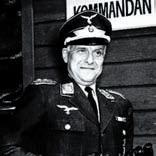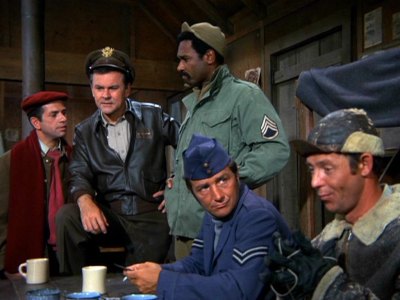While on a recent flight across the South Pacific, I pondered the challenges facing American education. Somewhere high above Guam it hit me. What we really need is a witty leadership book replete with checklists, platitudes, alliterations and lovable characters we can all relate to. Schools are in trouble and the job is too big for mice, fish or even Dr. Phil.
What color is your P.O.W. Camp?
A new paradigm is needed to focus our thinking and explore the inner administrator in each of us. I suggest that there are two types of leaders, Colonel Hogan and Colonel Klink. Both men had weighty responsibilities under stressful conditions. Despite their similar positions, Klink and Hogan had different constituents, management styles and visions.


Klink blindly followed orders and acted reflexively. His first impulse was self-preservation. Klink lacked a vision and a strategic plan. He managed through fear and threats of being shipped to the Russian front. Klink viewed his subordinates as interchangeable cogs in a system he didn’t control. Above all, Klink worked tirelessly to please his superiors and put their needs ahead of all else.
Hogan was a different kind of manager. His primary objective was to preserve liberty for his men and his country. He remained optimistic in the face of extreme challenges. While a strong leader, Hogan led through consistency and consensus. He was a risk taker, a planner and a problem solver. The needs of his subordinates were the centerpiece of his management style. Hogan was responsive to his stakeholders.
 Most of all, Colonel Hogan celebrated the unique talents, passions and personalities of his team. His men were empowered to experiment and lead. Interdisciplinary learning was the norm in Hogan’s barracks. Newkirk’s sewing (applied arts), Kinchloe’s radio skills (language arts/communication), LeBeau’s culinary talents (applied arts) and Carter’s gift for explosives and tunneling (science, math and geography) were critical to an organization striving to make the transition from good to great.
Most of all, Colonel Hogan celebrated the unique talents, passions and personalities of his team. His men were empowered to experiment and lead. Interdisciplinary learning was the norm in Hogan’s barracks. Newkirk’s sewing (applied arts), Kinchloe’s radio skills (language arts/communication), LeBeau’s culinary talents (applied arts) and Carter’s gift for explosives and tunneling (science, math and geography) were critical to an organization striving to make the transition from good to great.

So, which leadership style is closest to your own? Are you a Hogan or a Klink?
There is actually a third option – Sergeant Schultz. “I know nothing. I see nothing,” was Schultz’s favorite expression. Schultz was friendly, kind and jovial. However, his leadership style was fundamentally immoral. If you know better, then you are obliged to do better.
Think back to why you became an educator. Were your parents proud? Would they still respect your decision if they knew that you were enforcing policies causing thousands of third graders to be held indefinitely in the third grade based on the results of one flawed test? Were you moved to tears or filled with rage when the eight year-old Latino immigrant looked into the Nightline camera and said, “I guess I just didn’t try hard enough?” (to pass Florida’s FCAT)
Would the teachers who inspired you to teach be pleased that you were eliminating music, art, recess, science and/or social studies because General Burghalter wants every child to pass a norm-reference test? (an impossibility) Would you have become a teacher if you knew that you would be commanded to read from a canned script to captive children for several hours per day?
Many school children have to overcome all sorts of personal, economic and societal challenges in their everyday lives. The last thing a child needs is to battle teachers or an inflexible one-size-fits-all curriculum. Kids need allies when they are in school, not an axis of evil. They are dependent on you to do the right thing on their behalf. School needs to be an oasis that nurtures the body, mind and soul.
Isn’t it about time that we draft a Geneva Convention for teachers and learners? Don’t we need to create a set of principles governing how we humanely treat the people occupying our school buildings?
The Nuremberg Defense is simply unacceptable. Your position of authority is ordained based on an assumption of trust and an expectation that your efforts will benefit children. It is immoral and educationally ineffective to blindly enforce arbitrary regulations when we know that in many cases the opposite approach is required to benefit children.
Regardless of whether you are a Klink, a Hogan or a Schultz one thing is certain. The fräulein in the main office was the real brain behind the organization.
Originally published in the October 2003 issue of District Administration
Veteran educator Gary Stager, Ph.D. is the author of Twenty Things to Do with a Computer – Forward 50, co-author of Invent To Learn — Making, Tinkering, and Engineering in the Classroom, publisher at Constructing Modern Knowledge Press, and the founder of the Constructing Modern Knowledge summer institute. He led professional development in the world’s first 1:1 laptop schools thirty years ago and designed one of the oldest online graduate school programs. Gary is also the curator of The Seymour Papert archives at DailyPapert.com. Learn more about Gary here.

